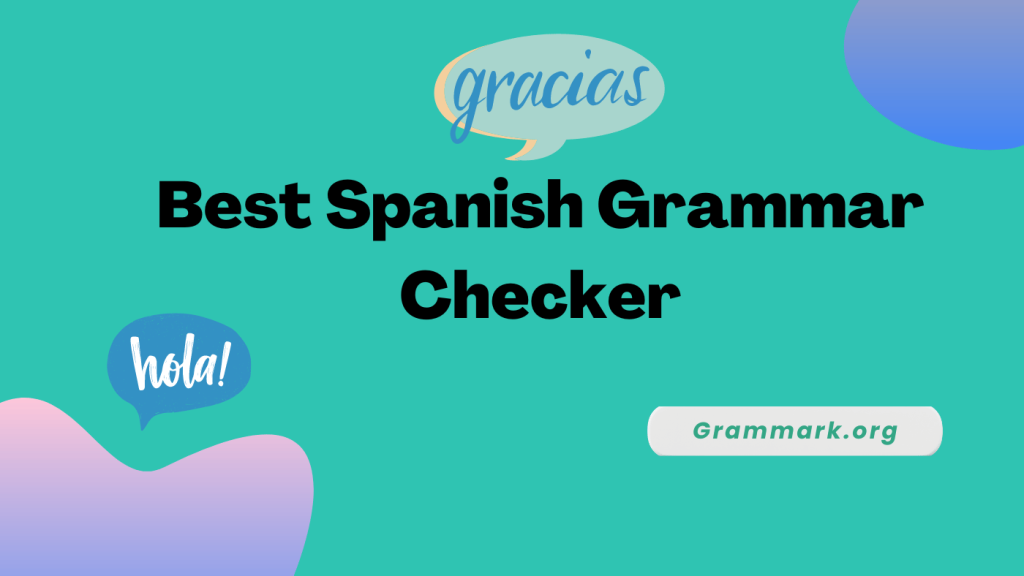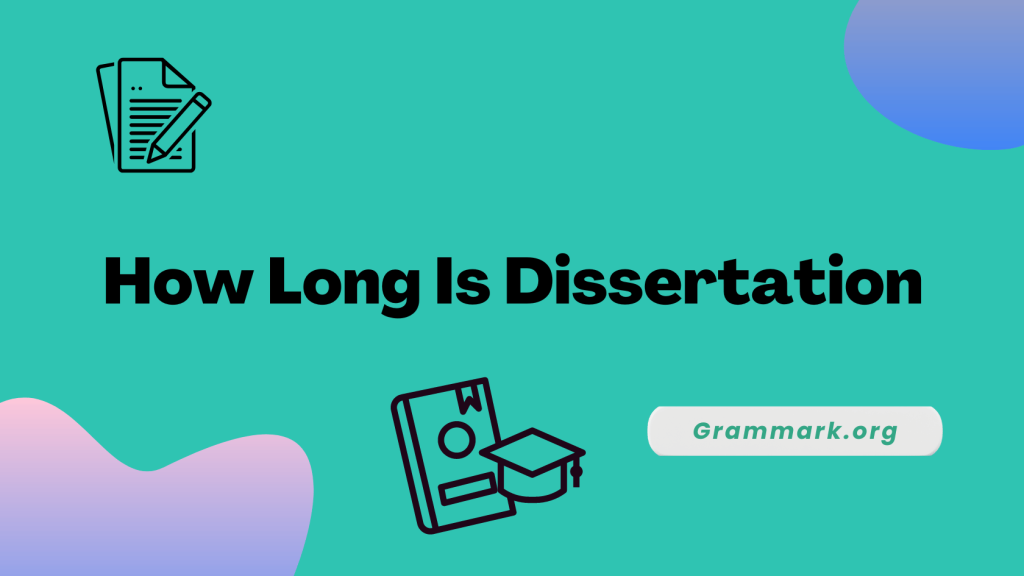Learning a new language can be challenging, especially due to the language itself, busy schedules, and limited access to quality resources. This can lead to frustration and slow progress, hindering personal and professional growth.
Therefore, I tested these 10+ best online language learning courses that you can check out. These are free and paid courses that can help you in learning a language without any hassle.
Top 10 Language Learning Courses In 2025
Find the best online language learning courses of 2025. These platforms offer comprehensive resources, interactive tools, and flexible learning options to help you achieve fluency and reach your language learning goals.
| Top Language Learning Courses | Learning Platform | Price | Level | Ratings | Course Link |
|---|---|---|---|---|---|
| First Step Korean | Coursera | Free | Beginner | 4.8 | Here |
| Italian Language and Culture | edX | Free | Beginner | 4.7 | Here |
| ASL University Lessons | Class Central | Free | Beginner | 4.6 | Here |
| Improve Your English Communication Skills | Coursera | Free | Intermediate | 4.7 | Here |
| Basic Spanish 1 | edX | Free | Beginner | 4.8 | Here |
| Chinese for Beginners | Coursera | Free | Beginner | 4.7 | Here |
| Teach English Now! Theories of Second Language Acquisition | Class Central | Free | Intermediate | 4.6 | Here |
| 30 Hours of Grammar and Language Awareness | edX | Free | Intermediate | 4.5 | Here |
| Mandarin Chinese Level 1 | edX | Free | Beginner | 4.8 | Here |
| Complete Japanese Course | Class Central | Paid | Beginner | 4.6 | Here |
Note: The ratings available are taken from the course where users rated their experience.
These top-rated courses below offer a detailed suite of resources, interactive tools, and flexible learning options to help you achieve fluency in your language learning goals.
So, let’s review each of these courses and determine whether either one is a perfect fit for your needs.
1. Coursera: First Step Korean
- Duration: 5 weeks
- Instructor: Professor Seung Hae Kang
- Teaching Method: Video lectures, interactive quizzes
- Rating: 4.8/5
This introductory course explains the basics of the Korean language. You will learn Hangul, the Korean alphabet, basic grammar, and essential vocabulary, and it also offers cultural insights to enhance your learning experience.
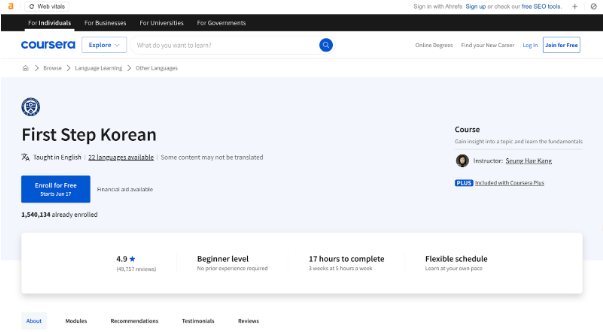
Overall, I would say First Step Korean is best for beginners, as it provides a detailed start to your Korean language journey. You can access this course for free for a limited time period, but you won’t get the certificate after finishing the course. You need to buy the paid version of this course, or you can buy a Coursera Plus subscription from Coursplus.discount website at a huge discount.
2. eDX: Italian Language And Culture
- Duration: 6 weeks
- Instructor: Daniela Bartalesi-Graf
- Teaching Method: Video lectures, assignments
- Rating: 4.7/5
Wellesley College offers this beginner course an Italian language journey. In it, you will learn basic vocabulary, grammar, and conversational skills while traveling around Italy’s rich cultural heritage.
This course is better for those new to Italian as it provides a solid foundation in language and culture.
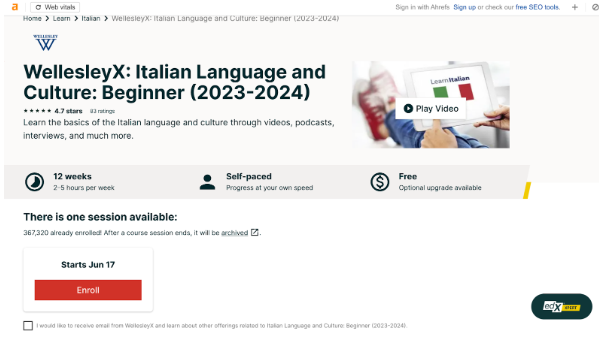
3. Class Central: ASL University Lessons
- Duration: Self-paced
- Instructor: Dr. Bill Vicars
- Teaching Method: Video tutorials, practice exercises
- Rating: 4.6/5
This American Sign Language course is specially designed for beginners. Here, you will cover the fundamentals of ASL, including finger spelling, basic vocabulary, and sentence structure.
In addition, the ASL University lesson course also introduces you to the Deaf culture and offers a well-rounded introduction to both the language and the community.
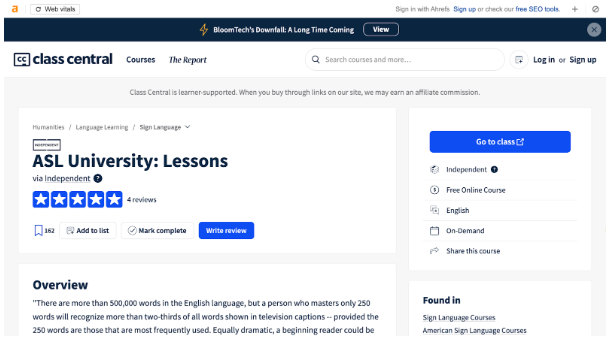
4. Coursera: Improve Your English Communication Skills
- Duration: 4 months (self-paced)
- Instructor: Multiple instructors
- Teaching Method: Video lectures, interactive projects
- Rating: 4.7/5
In this four-month self-paced course, you can improve your English proficiency by indulging in your communication skills. The more you participate in practical exercises and real-world applications, the better your writing, speaking, and professional interaction abilities will be.
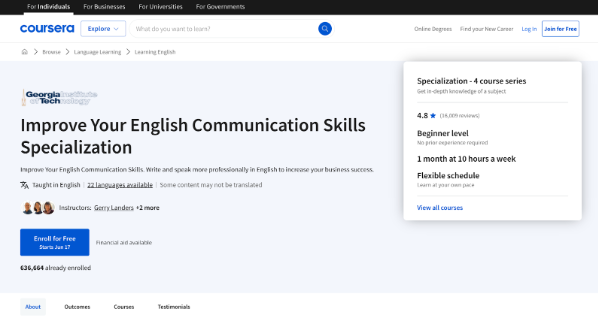
It is truly ideal for non-native speakers as you are constantly exposed to various English-speaking environments.
5. eDX: Basic Spanish 1
- Duration: 7 weeks
- Instructor: Dr. Kim Potowski
- Teaching Method: Video lectures, assignments
- Rating: 4.8/5
Start your Spanish language journey with this introductory course from Universitat Politècnica de València. Here, you will learn essential vocabulary, grammar, and pronunciation to build a solid foundation in Spanish.
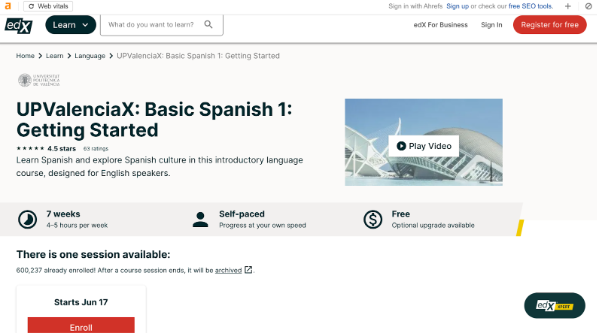
Think about these lessons as a way to emphasize your practical communication skills. So, if you are a beginner, then it is the perfect place to start your Spanish.
6. Coursera: Chinese For Beginners
- Duration: 6 weeks
- Instructor: Xiaoyu Liu
- Teaching Method: Video lectures, interactive exercises
- Rating: 4.7/5
As the name suggests, Chinese for Beginners is the starting level of the Mandarin course.
You will learn basic vocabulary, pronunciation, and grammar while gaining insights into Chinese culture. Perfect for those with no prior experience, this course will help you start speaking and understanding Mandarin Chinese within no time.
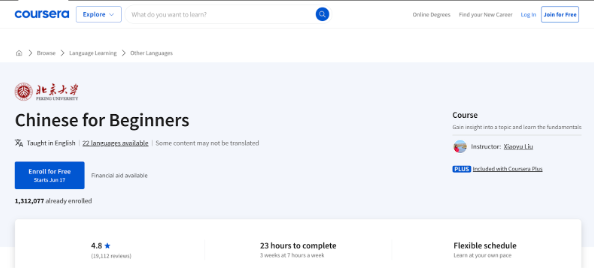
7. Class Central: Teach English Now! Theories Of Second Language Acquisition
- Duration: 4 weeks
- Instructor: Dr. Jessica Cinco
- Teaching Method: Video lectures, peer-reviewed assignments
- Rating: 4.6/5
The Theories of Second Language Acquisition is best designed for aspiring English teachers. Understanding different concepts and methodologies upgrades your teaching practice, so educators benefit greatly from this course.
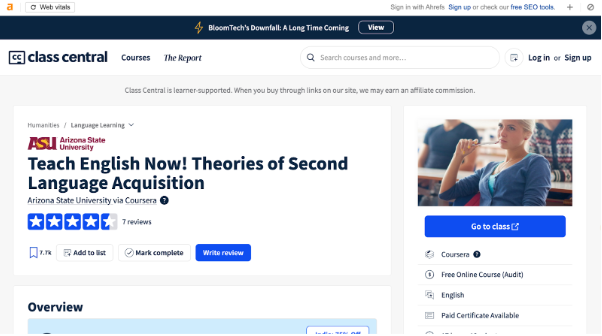
8. eDX: 30 Hours Of Grammar And Language Awareness
- Duration: 30 hours
- Instructor: TEFL Org instructors
- Teaching Method: Video lectures, quizzes
- Rating: 4.5/5
Improve your teaching skills with this focused course on grammar and language awareness.
TEFL Org offers it and covers essential grammar rules and teaching strategies to help you effectively teach English as a second language. So, if you are an aspiring or an existing teacher, it will provide you with valuable insights and practical knowledge.

9. eDX: Mandarin Chinese Level 1
- Duration: 6 weeks
- Instructor: MandarinX
- Teaching Method: Video lectures, interactive exercises
- Rating: 4.8/5
Begin your Mandarin Chinese journey with this Level 1 course from MandarinX. You will learn fundamental vocabulary, grammar, and pronunciation while gaining cultural insights.
Perfect for beginners, this course offers a structured approach to learning Mandarin, making it easier to start speaking and understanding the language.
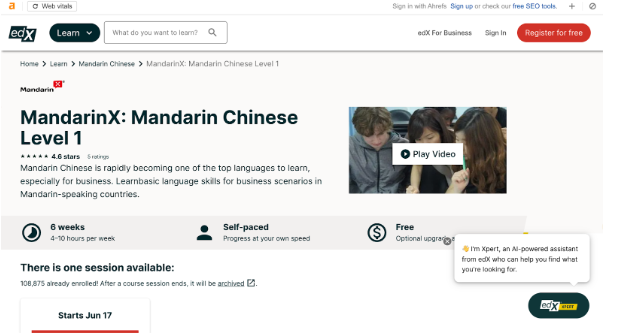
10. Class Central: Complete Japanese Course
- Duration: Self-paced
- Instructor: Udemy instructors
- Teaching Method: Video tutorials, practice exercises
- Rating: 4.6/5
Master the basics of Japanese by learning essential vocabulary, grammar, and conversational skills. The best part is that you can do all of this in Japanese culture, and in no time, you will notice that you can speak and understand Japanese confidently.
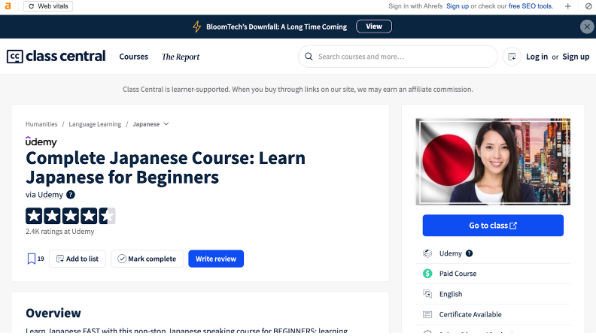
So, if you are a beginner, the Complete Japanese Course is specially designed for you.
Common Challenges While Learning A Language
Learning a new language can be incredibly rewarding but comes with various challenges. Here are some of the most common obstacles learners face and ways to overcome them:-
1. Lack Of Practice Opportunities
One of the biggest hurdles in language learning is finding regular opportunities to practice speaking with native speakers. This can be especially difficult if you are not living in a country where the language is spoken.
Solution: Join language exchange programs, participate in online speaking clubs, or use apps like HelloTalk and Tandem that connect you with native speakers. Practicing with language partners can significantly enhance your speaking skills and confidence.
2. Stagnancy
Many learners experience periods where their progress seems to stagnate, even though they are making an effort. These times can be discouraging and may cause them to lose motivation.
Solution: Change your learning methods by incorporating different media types, such as podcasts, movies, and books in the target language. Setting new yet challenging goals can help you break through these plateaus and continue progressing.
3. Pronunciation Difficulties
Pronouncing new sounds and mastering the accent of a foreign language can be particularly challenging, especially when these sounds do not exist in your native language.
Solution: Use pronunciation tools and apps like Forvo and Speechling to practice and improve. You can also mimic native speakers through shadowing exercises (repeating what they say).
I have done that quite a bit, and trust me, it is really effective. Another thing you can do is regularly listen to native speakers through various media, which can help you understand the correct pronunciation.
4. Vocabulary Retention
Retaining new vocabulary is a common issue for language learners. The volume of new words can be overwhelming, and without regular use, it’s easy to forget them.
Solution: Use spaced repetition systems (SRS) like Anki or Quizlet to review vocabulary at increasing intervals.
Creating flashcards and incorporating new words into your daily conversations and writing exercises can also help reinforce your memory. You can also apply vocabulary in practical contexts to enhance retention.
5. Grammar Complexities
Understanding and mastering the grammar rules of a new language can be daunting, particularly if they differ significantly from your native language.
Solution: Break down grammar rules into manageable parts and study them incrementally. Use resources like grammar workbooks, online exercises, and apps focused on grammar practice.
Learning grammar in context, through sentences and real-life usage, can also be more effective than isolated rules.
6. Cultural Differences
Language learning is deeply connected to cultural understanding. Therefore, without proper exposure to the culture associated with the language, learners may struggle with idioms, expressions, and cultural nuances.
Solution: Immerse yourself in the culture through movies, music, literature, and interaction with native speakers.
Understanding cultural traditions, social norms, and idiomatic expressions will enhance your language comprehension and enrich your learning experience.
7. Consistency and Motivation
Staying consistent and motivated throughout the language learning process can be challenging, especially with busy schedules and competing priorities.
Solution: Set clear, achievable goals and create a consistent study routine. Engaging with language learning communities, celebrating milestones, and using apps that gamify the learning process can help maintain your motivation.
By addressing these common challenges with effective strategies, language learners can overcome obstacles and progress steadily on their journey to fluency.
Conclusion: Coursera Offers The Best Language Learning Courses!
Learning a new language opens doors to cultural understanding and career opportunities.
The top language learning courses of 2025 provide excellent resources for all levels of learners. Considering the top ratings, Coursera offers all-rounder courses irrespective of the language you want to learn.
However, if you have a hard time choosing one course, then here are my recommendations:-
- First Step Korean – for beginners mastering Korean basics
- Improve Your English Communication Skills – for non-native speakers to enhance English proficiency.
Start your language-learning adventure today by choosing a course from our list!
FAQs
The best courses align with your goals, offering thorough content and interactive methods. Some of my favorite courses from Coursera include First Step Korean, Chinese for Beginners, and Improve Your English Communication Skills.
The best program depends on your needs. Rosetta Stone is great for immersion, while Coursera offers structured, university-level courses.
Most of Coursera’s offered language learning courses are available for free audit.
Mix regular practice, engage with native speakers, use diverse resources, and set clear goals for the best way to study a language.
Online learning offers convenience, flexibility, diverse resources, personalized experiences, and often lower costs.

